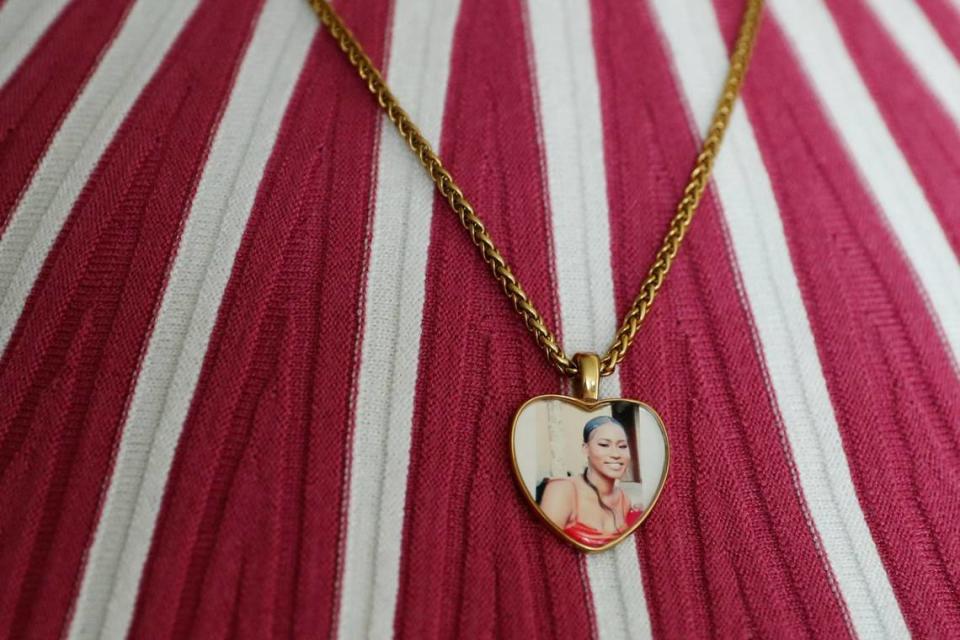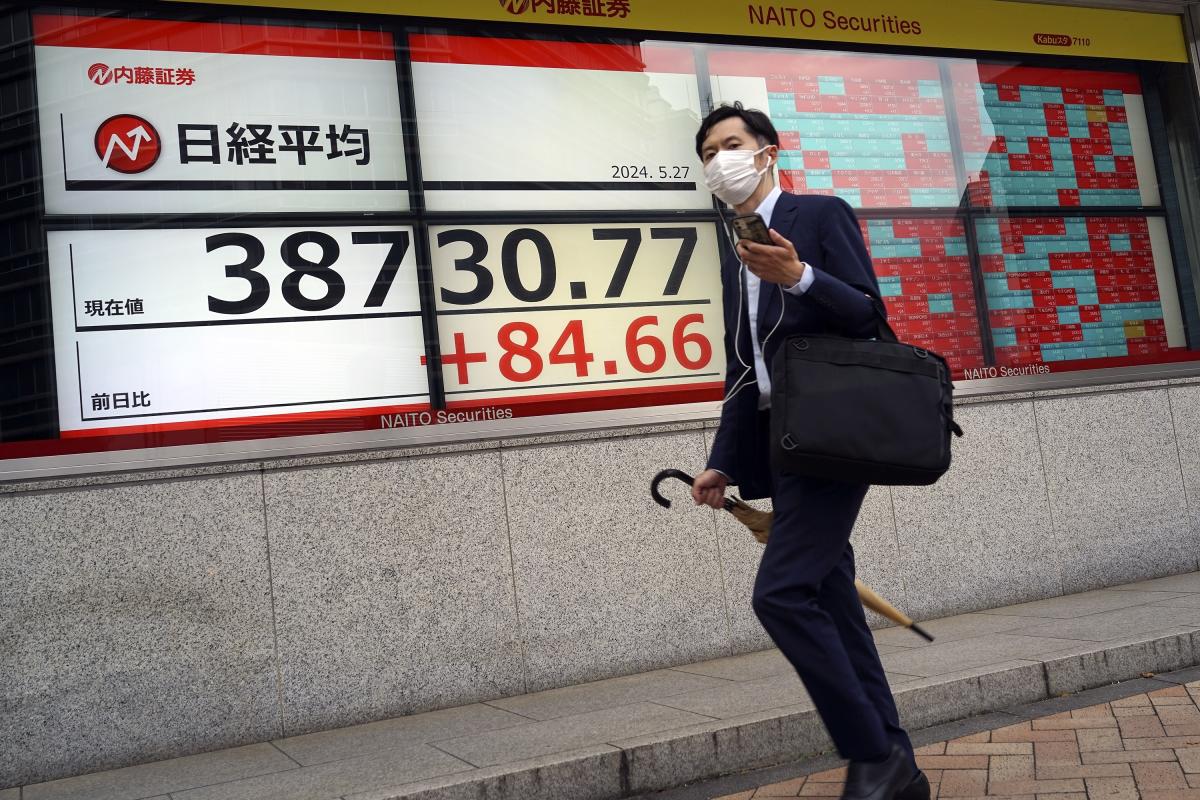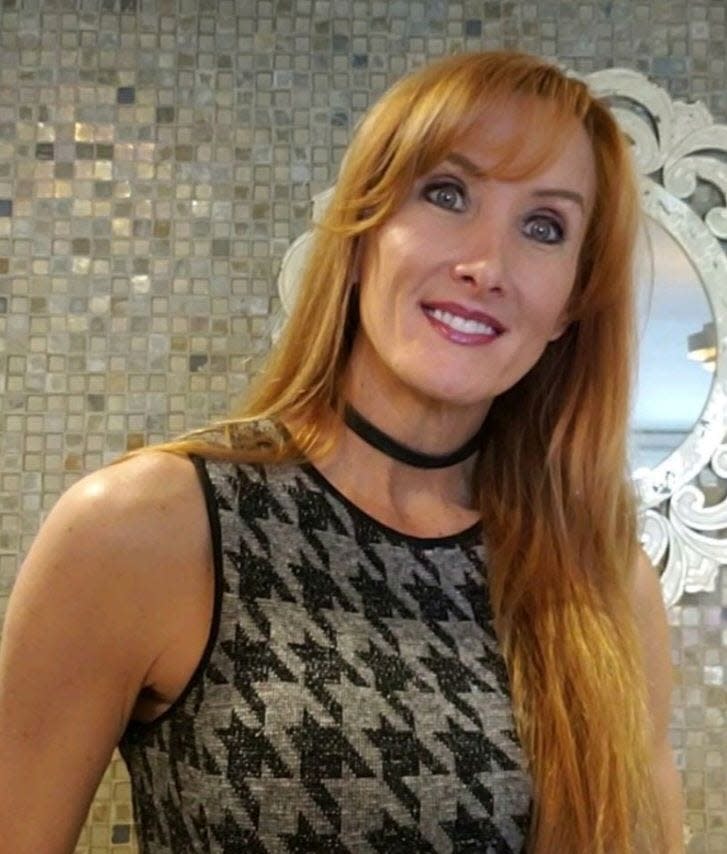Six months after her daughter’s death, Jenele Hughes and her family attended what would have been the teen’s graduation from Grandview High School.
Like many seniors, her daughter Amauri Hughes had been excited to graduate and start the next phase of her life. She had planned to attend Florida A&M University, and then become a flight attendant to travel the world.
Before school started, her mom picked out a shirt on Amazon that said “Proud mama of a 2024 senior,” and found similar ones for Amauri’s sister, brother, grandparents, aunts and other relatives. She let the shirts sit in her online cart for months, unsure if the family should wear them for Amauri’s senior photos or save them for graduation.
But the opportunity to stand beside her daughter for those occasions was taken from her.
In November, 17-year-old Amauri was reported missing. She was found dead the following day with stab wounds, a gunshot injury, bruises and missing teeth. Her boyfriend Tyheem V. Anderson, 19, was charged with second-degree murder, first-degree assault, kidnapping, unlawful use of a weapon and three counts of armed criminal action.
The violence cut short the life of a young girl who loved competitive cheerleading, excelled in coding classes and, by the time she was 11 or 12, started a hair styling business in the family’s home. She was an active older sister who helped teach her siblings to walk, cooked for them and showed up to cheer them on at their events.
As time passed, Jenele Hughes decided to order the shirts anyway, and wore them to work ahead of graduation. She is still Amauri’s proud mother, she reasoned. She always will be. But as the ceremony approached, her excitement turned to anger and sadness. An empty chair sat on the stage where her daughter should have been, with a cap and gown draped in Amauri’s honor.
“You see everything on social media about all these people graduating, walking across the stage, and you don’t get that experience. Someone took that from you,” Jenele Hughes said. “And though I’m happy for everyone else and glad that they get to experience that, I’m jealous as well that all I can walk away with was a sign that I had made and taking a picture with a sign and not a child.”
The school called her daughter’s name and held a moment of silence. Jenele Hughes burst into tears and decided to leave. She didn’t want to overshadow the moment her daughter’s classmates and friends had worked toward for years.
Amauri’s story is far from an isolated case.
In 2023, Kansas City’s deadliest year ever recorded, Amauri was among 19 minors who died by homicide. By the end of the year, there had been 185 homicides in the city — the deadliest year on record in Kansas City — with just over 10% of those deaths among youth. Of the 70 homicides in Kansas City as of June 20, 10 juveniles have died, according to data tracked by The Star, totaling over 14% of homicides.
The rise in gun-related injuries among youth in Kansas City has been steep this year, officials say.
Over the last year, the emergency room at Children’s Mercy has seen a significant increase in patients admitted with gunshot wounds and other forms of “penetrating trauma,” said Dr. Jennifer Watts, a pediatric emergency medicine physician.
In 2023, Kansas City police reported 59 children and teens wounded by gunfire. As of June 16, 52 youth gunshot wounds have already been reported in 2024, according to data from police.
As the numbers rise, so does the heartbreak for families across Kansas City.
Among the youth killed this year: 17-year-old Benyamin Hawthorne, who was fatally shot on a basketball court at a park; 11-year-old Kourtney Freeman, who was shot and killed while getting ready for bed in her home and 17-year-old Carlos Gonzalez, who was fatally shot alongside his childhood friend.
‘Part of everyone’s story’
In the past, many young patients have come to Children’s Mercy with unintended gunshot wounds, sometimes caused when a child found a weapon and mistakenly fired it. Now, whether it’s a homicide or suicide, the hospital’s emergency department is treating more patients with intentional gunshot injuries, Watts said.
“These are things that could be prevented,” Watts said, “and it’s heart-wrenching to see it increase and continue to increase.”
As staff work to heal patients’ physical wounds, they’re also starting to help them process the traumatic events they’ve experienced with preventative mental health treatment. That work includes normalizing a child’s fears after a traumatic event and providing a space where they feel safe.
“Once an injury occurs, it’s a part of that child’s life forever,” Watts said. “It’s a part of that family’s life forever. But if we can help mitigate some of the symptoms that they have just post-trauma, then the better off that kid and that family will be.”
The ongoing threat of violence poses an obstacle to helping children heal from traumatic events, said Alexandra Beineman, vice president of clinical advancement at Camber Children’s Mental Health. As kids work through their mental health issues, they’re often exposed to stories of loved ones and other community members impacted by violence, even at events meant to be safe for families.
“If that is happening in the community, then our kids are feeling that, they’re bearing the weight of that,” Beineman said. “It’s a part of what they’re having to process with their mental health struggles.”
Camber was one of the area providers to offer free virtual therapy sessions to children impacted by the shooting at the Kansas City Chiefs Super Bowl victory rally at Union Station on Feb. 14 that killed one person and left 24 others shot, including nine children. They heard from and helped families who didn’t know how to help their child process their feelings after that day.
It’s important all families and caretakers learn to talk to their children about community violence, Beineman said. Whether or not it’s impacted them directly, she said, kids are aware that it’s a problem.
One of those kids was 11-year-old Kourtney Freeman, who worked throughout the last school year on anti-violence initiatives with her classmates at Ewing Marion Kauffman School. About two weeks before the students were set to host a workshop on community violence, Kourtney was fatally shot while getting ready for bed in her home.
“At this point, it’s really just a part of everyone’s story,” Beineman said. “So I think that if we’re looking at kids who are feeling anxious, who are struggling with trauma responses, whether that’s behaviorally or impulse control or suicidal ideation, with the level of community violence we’re seeing in our communities across America, it would be ignorant to not assume that that is part of that child’s story.”

‘Everyone needs to care’
Rosilyn Temple founded KC Mothers in Charge about a decade ago, after losing her son to gun violence in 2011 when he was 26 years old. She travels to homicide scenes across the city and offers support and resources to victims’ families.
In the early days of KC Mothers in Charge, Temple remembers the August 2013 killing of 3-year-old Damiah White and her mother, Myeisha Turner, who were found dead inside their home. Speaking with a homicide detective at the time, they talked about how more children like Damiah would die if community leaders didn’t step up to help curb gun violence.
In the years since, their fears have come true.
When someone dies in their community, whether or not they know the victim or their family, everyone needs to care, Temple said.
Through her organization, Temple hosts canvassing events and vigils to remember victims lost to gun violence and push to solve their cases. To help lower homicide rates, she thinks more community members need to learn about the issue and do what they can to spread awareness, while organizations like hers work to provide support, as they did after the death of Amauri Hughes.
After her daughter’s death, Jenele Hughes felt alone, even in rooms where everyone loved her. People offered support with good intentions, but at times it was overwhelming. It felt like her privacy had been stripped, and everyone in the community was watching her.
Then Temple reached out, and Hughes found an outlet in KC Mothers in Charge. There, she said, she’s surrounded by people who know what she’s been through. On the third Thursday of every month, she meets them for group therapy.
“You get to be free and just let it out, and you’re not judged for anything,” Hughes said. “You can scream, cry, roll on the floor, laugh. It has been probably the best release for me that I have had as of yet, and I am truly grateful.”
Hughes has learned that she’ll never fully heal from her daughter’s death, but she hopes to still have a fulfilling life and turn her attention toward activism focused on preventing domestic violence and homicide.
Mitigating violence will require help from every part of a community to ensure kids have safe places to go, and have adults in their lives who model healthy conflict resolution skills and mental health resources, Beineman said.
She hosts two free webinar series a year for community members on pertinent mental health topics. Last fall, the program discussed violence in schools and communities and its effects on young people. In spring, the series focused on PTSD and the impact trauma has on the brain. Both times, the webinar looked at ways communities can support young people processing these issues.
Hughes also believes that, in order to lessen violence in communities, adults should step up, watch over the young people in their area and treat them as their own children. Kids in her neighborhood know that her home is a space they can come for food, water and birthday presents, she said, but they also know she’ll discipline them when they’re out of line.
It’s important, Hughes said, to be the person who speaks up when they see something wrong, even if there’s fear involved.
When Hughes first knocked on doors after learning her daughter was missing, only two women answered and tried to help. The man living closest to where her daughter was killed shut the door in her face and refused to help. She wonders if some information he could’ve provided may have been the difference that saved her daughter’s life.
“Maybe you could’ve helped save a 17-year-old from sitting in a house for two days being tortured and dying,” Hughes said. “But you were so unwilling to be a part of what could have been a solution.”
Signup bonus from





